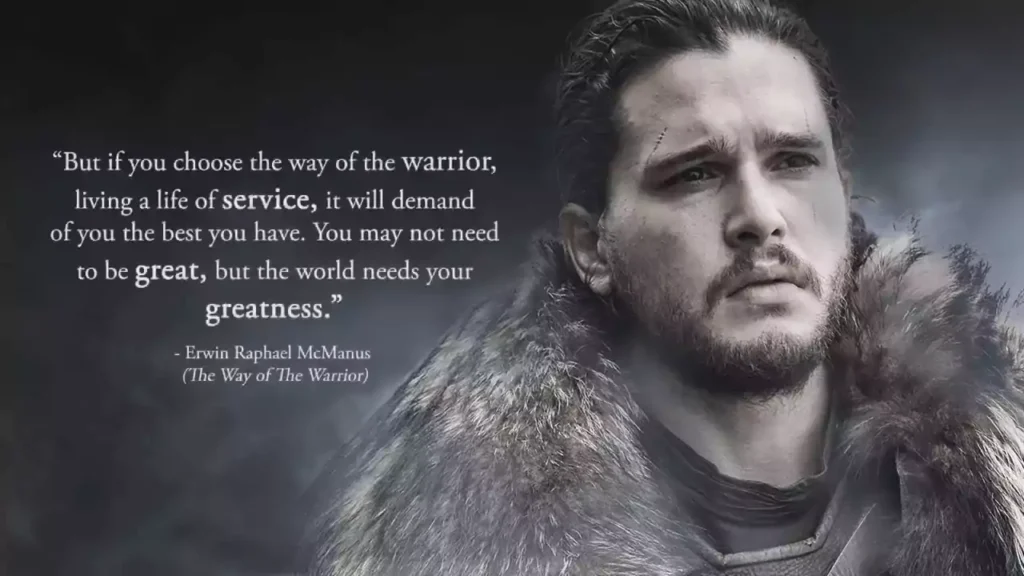Introduction: The Warrior Is Disappointed in You
The phrase “the warrior is disappointed in you” carries a lot of weight and can stir up a mix of emotions. It often implies a deep sense of dissatisfaction or failure, particularly in contexts where high standards and personal growth are emphasized. This article will explore the significance of this phrase, the reasons behind such disappointment, and how to respond constructively to it.
The Significance of Disappointment from a Warrior
What Does It Mean When a Warrior Is Disappointed?
When we say “the warrior is disappointed in you,” we are referring to a figure or person who holds high expectations and values discipline, honor, and perseverance. A warrior, in many cultures and philosophies, symbolizes someone who is steadfast, courageous, and committed to achieving excellence. Therefore, if a warrior expresses disappointment, it indicates a serious concern about failing to meet those standards.
The Impact of Disappointment
Disappointment from a warrior can be more than just a personal setback; it can affect your motivation, self-esteem, and overall outlook. It is essential to understand the gravity of such disappointment and how it can influence your journey toward personal and professional growth.
Common Reasons for Disappointment
Lack of Commitment and Discipline
One common reason a warrior might be disappointed is a perceived lack of commitment and discipline. Warriors value dedication and the ability to push through challenges. If you fail to demonstrate these qualities, it can lead to feelings of disappointment from someone who holds you to high standards.
Failure to Meet Expectations
Another reason could be failing to meet set expectations. Warriors often set high benchmarks for themselves and others. If you fall short of these expectations, it might result in disappointment, as it signifies a gap between your potential and your performance.
Not Learning from Mistakes
A warrior’s disappointment can also stem from not learning from past mistakes. In the warrior ethos, growth comes from understanding and correcting errors. Repeated mistakes without showing improvement can lead to a sense of letdown from those who are guiding you.
How to Respond to Disappointment
Self-Reflection and Accountability
The first step in addressing disappointment is self-reflection. Take time to assess what went wrong and why. Accountability is crucial—acknowledge your mistakes and understand how they contributed to the warrior’s disappointment. This process helps in learning and growing from the experience.
Seek Feedback and Guidance
Reach out for feedback and guidance. Constructive criticism can provide valuable insights into areas of improvement. Engaging with mentors or those who hold you to high standards can help you better understand their expectations and how to meet them.
Develop a Plan for Improvement
Create a plan for improvement based on the feedback you receive. Set clear, achievable goals and establish a roadmap for reaching them. Consistent effort and a commitment to improvement can help regain trust and confidence.
Embracing the Warrior’s Standards
Understanding the Warrior’s Perspective
To avoid future disappointment, it’s important to understand the warrior’s perspective. Embrace their values of discipline, honor, and perseverance. By aligning yourself with these principles, you can better meet their expectations and avoid situations that might lead to disappointment.

Adopting a Warrior’s Mindset
Adopting a warrior’s mindset means being proactive, resilient, and focused on personal growth. This mindset can help you overcome obstacles and maintain high standards in both personal and professional areas. It’s about embodying the qualities that the warrior values, thus reducing the likelihood of future disappointment.
Learning and Growing from Disappointment
Turning Disappointment into Motivation
Disappointment, while challenging, can also be a powerful motivator. Use it as a catalyst for change and improvement. Channel your feelings into positive actions that drive you toward achieving your goals.
Building Resilience and Strength
Each experience of disappointment can contribute to building resilience and strength. By facing these challenges head-on and learning from them, you enhance your ability to handle future obstacles with greater confidence and skill.
Maintaining a Positive Attitude
A positive attitude is crucial when dealing with disappointment. Focus on the lessons learned and the progress made. This perspective helps maintain motivation and a forward-looking approach, even in the face of setbacks.
Conclusion: Moving Forward
“The warrior is disappointed in you” is a powerful statement that highlights the importance of meeting high standards and personal growth. By understanding the reasons behind such disappointment and taking proactive steps to address it, you can turn these experiences into valuable lessons. Embrace the principles of discipline, commitment, and resilience to align with the warrior’s expectations and transform disappointment into a pathway for success.
Remember, the journey from disappointment to achievement is a process, and each step you take toward improvement brings you closer to fulfilling your potential and meeting the high standards set before you.



